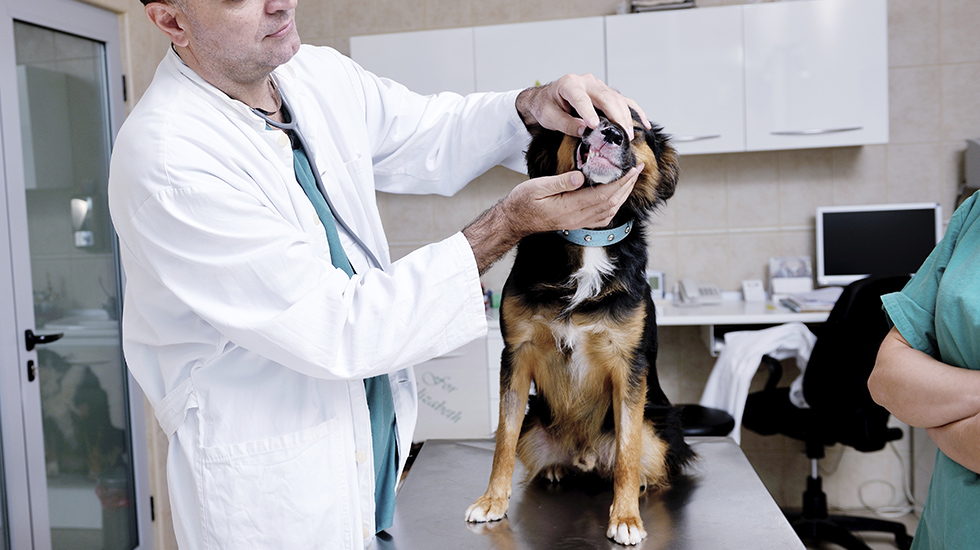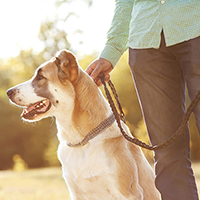
Contrary to popular belief, dogs do not age at a rate of seven human years for each year in their life. That age-old formula is probably based on the fact that dogs age faster than humans and have shorter life spans.
Dogs are considered “senior” at about seven years old. Nonetheless, they still have plenty of life left in them at that age. Larger breeds tend to have shorter life spans than smaller breeds, so they are often considered senior at 5 to 6 years of age. Perhaps the best indication that a dog has become a senior is the emergence of age-related health problems.
A graying coat and a slower pace are outward signs of aging, of course. But it’s important to note that a dog’s organ systems are also changing with age. An older dog is more likely to develop diseases such as heart, kidney and liver disease, cancer, or arthritis. Cancer accounts for almost half of the deaths of pets over 10 years of age. Dogs get cancer at roughly the same rate as humans.

It’s also normal for older dogs to lose some of their sight and hearing—similar to humans. Older dogs may develop cataracts. Dogs with poor sight or even blindness can get around in familiar environments. If your dog’s eyesight is failing, avoid rearranging or adding furniture or other items that could become obstacles.
Arthritis often develops in older dogs. As a dog ages, he might seem less interested in chasing a ball at the park or find it difficult to jump upon his favorite chair or into the family car. Arthritis might also cause a dog to be depressed or irritated when you attempt to pet him.
Changes in behavior could be an early indicator of aging. These changes might be linked to arthritic pain or a loss of sight or hearing. Some behavior changes might be the result of a cognitive dysfunction, similar to senility in people.
A dog’s weight can have a significant impact on his health as an older pet. Excess weight on an older dog increases the risk of arthritis, difficulty breathing, insulin resistance or diabetes, heart disease, high blood pressure, skin problems, cancer and other conditions. An overweight dog may not show any early warning signs of health problems, so regular visits to your veterinarian are recommended.
Because senior dogs are more likely to develop age-related problems, they should be regularly examined by a veterinarian to keep them healthy and to detect problems before they become more difficult and costly to treat. Talk to your veterinarian about a preventive care schedule that best suits your dog.
Gastrointestinal (GI) issues in cats and dogs are not unusual. Since there are many common causes, being able to recognize sudden changes in your pet’s digestion can help you and your veterinarian provide the best care. Be familiar with your pet’s daily routine so that you can help determine whether your dog or cat is experiencing an upset stomach or a more serious issue.
Learn about managing digestive issues and how a therapeutic diet based in scientific research can help. Visit sciencehappens.royalcanin.com to learn more.

As your dog ages his needs will start to change. Download this e-book to learn what to expect and get helpful tips on caring for your senior dog.
Get Free Download Now What Your 12-Week-old Puppy Needs
What Your 12-Week-old Puppy Needs
What Your 12-Week-old Puppy Needs
What Your 12-Week-old Puppy Needs
 Summer Paw Pad Injuries & Paw Pad Care for Dogs
Summer Paw Pad Injuries & Paw Pad Care for Do
Summer Paw Pad Injuries & Paw Pad Care for Dogs
Summer Paw Pad Injuries & Paw Pad Care for Do
 Feeding Puppies, Large and Small
The range of sizes among dog breeds
Feeding Puppies, Large and Small
The range of sizes among dog breeds
 7 Foods Dogs Should Not Eat
Harmful Snacks
Most dogs will samp
7 Foods Dogs Should Not Eat
Harmful Snacks
Most dogs will samp
 The Skinny on Dog Skin Conditions
The Skinny on Dog Skin Conditions
The Skinny on Dog Skin Conditions
The Skinny on Dog Skin Conditions
Copyright © 2005-2016 Pet Information All Rights Reserved
Contact us: www162date@outlook.com